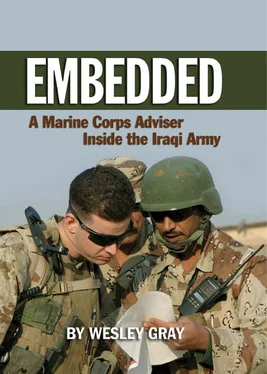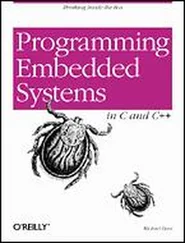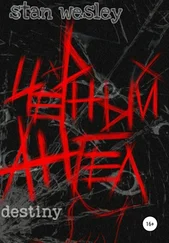Moody expanded his discussion of Iraqi tribalism. “Jamal, do you know who understood the tribes better than anyone? Saddam Hussein. He was a master.” Moody followed his praise for Saddam with an example. “Not long ago, two tribes were in a bitter feud because the tribal sheikhs could not agree on the appropriate blood money amount one tribe owed to the other,” he said. “After two days of fighting, there were thirty-eight dead on one side, and forty-five dead on the other, with no resolution in sight. This situation looked like it would end in the destruction of the two tribes.”
Moody paused to catch his breath. “The next day, when the two tribes were standing toe to toe with guns, mortars, artillery, and RPGs ready to destroy each other, Saddam Hussein came to the rescue.” I replied, “Did he fly to the scene in his Superman costume?” Moody laughed. “No, Jamal, there were no Superman costumes involved, but he did send an MOD official from Baghdad to help mediate the issues within the tribes. He asked each sheikhh how much blood money would be required to compensate for the mounting losses on their side. Once the two amounts were negotiated, the official paid the sheikhhs on the spot and told them it was courtesy of Saddam Hussein. The groups quit fighting and went back to a peaceful existence and a high appreciation for Saddam.” I said, “So Saddam became the peacemaker and hero at the same time?” Moody sneered. “Exactly. And now you Americans want to kill the guy who finally got the tribes to agree on something—you’re crazy!”
Our tribal discussion continued. All these new ideas infiltrating my mind were creating new questions I needed Moody to answer. I gave him the best “what-if” scenario I could muster. “Moody, what would happen if some poor man in a tribe accidentally rams his car into someone in another tribe. He will obviously not have the cash to cover the blood money and this simple event could effectively lead to tribal warfare. How do the tribes control these situations?”
“The tribes have a solution to this situation and many like it,” Moody replied. “Effectively, all the tribes in Iraq collect a tax from their members. Personally, I pay around a thousand dinar a month, which is roughly one American dollar. This money goes into what I’ll call a blood money fund. When the poor tribal members run into problems with rival tribes and cannot afford to pay the blood money on behalf of the tribe, the fund is used to ensure the money is paid and no further violence takes place. It’s like an insurance policy.”
I had more questions for Moody. “This sounds like a welfare policy. Do you have any freeloaders who look at the blood money fund and say, ‘this is a great opportunity to kill someone from the other tribe that I really hate with the added benefit that I won’t even have to pay for it?’” Moody answered, “The tribes have this one figured out as well. Before the tribe will use the blood money pot to pay off a member’s blood money debt, the sheikhs make certain you are a good member of the tribe and investigate the circumstances of the death. If the tribal sheikhh senses a member was freeloading on the system he would simply hand them over to the other tribe who would subsequently kill the individual responsible for their member’s death.” I said, “Wow. Sounds like you have it figured out.”
My discussion with Moody on tribalism somehow shifted to the topic of beatings. After learning about tribalism’s peculiarities, I was not sure Moody could shock me any further. I was wrong. Moody began his lecture on beating people. “Jamal, there is a beating chain of command in Iraqi society. The oldest males sit at the top of the chain of command and the youngest sit at the bottom.” Puzzled, I asked, “A beating chain of command?” Moody said, “Yes, a beating chain of command. Here is how it works. Say you are around the dinner table and the youngest son calls the oldest son a ‘weakling.’ The eldest son, the middle son, and the father, whose honor and respect have been violated, are obligated to beat the offender. And the instigator is obligated to let the beatings happen without a struggle.” I asked, “The older brother, middle brother, and father are obligated to beat the youngest brother? Are you kidding?” Moody responded, “Yes, obligated. One time I had to beat my brother for three hours in the shower until my father said I had gone too far. My heart was broken for beating him, but we both knew it was necessary.”
I had to ask Moody another question. “Wait a second. Why exactly was it necessary for you to beat your brother for three hours? That seems excessive.” Moody explained his logic. “Jamal, this is very difficult for Americans to understand, but I will explain it to you anyway. Let’s say I did not beat my brother. Let’s also assume the word gets out to the rest of the community that my youngest brother disrespected me and was not punished. This would effectively show the community that the males of my household can’t even take care of our own internal affairs.” He paused before continuing his lecture. “Not only does my youngest brother lose his honor in the community, but I lose my honor, my father loses his honor, my grandfather loses his honor, and the entire lineage of males related to my brother lose their honor. Because of this, the family must be sure the youngest brother is beaten. Likewise, the youngest brother will be more than willing to take his beatings, because he understands the consequences of his actions.”
I thought about Moody’s beating story. I think I understand the logic. Effectively, if individuals know they will get harsh punishments for doing something wrong, this acts as a strong deterrence. The logic of this system helps explains why Arab nations are more apt to do public beheadings, public beatings, and public limb amputation. The government wants the community to know that if they do not respect society, they will be punished severely.
Iraqi culture is fascinating and very different from our own.
Chapter 11
Death Operations
September 2006
We got a call one afternoon from the brigade MiTT. The news was terrible: a jundi from the Iraqi brigade had been melted by a mortar shell that landed on the Barwana FOB. When an Iraqi soldier becomes an “angel” (what the U.S. military calls a dead jundi ) a lot of work is involved. One of our jobs as a MiTT is to coordinate for transportation of the deceased angel from the location of his death to Baghdad. We are also in charge of ensuring there is a MiTT member and an Iraqi soldier with the body at all times until it reaches Baghdad. Once the body reaches Baghdad, the family takes custody and the situation is no longer in the U.S. military’s hands.
After some discussion, Major Pyle determined that SSgt. Daniel Valle, or “V” as he was called, would be the Marine escort. With V as the designated hitter for the escort mission, it was time to conscript a jundi to be the Iraqi escort. I was sent to ask the Iraqis who they wanted to send. I sprinted to the Iraqi swahut area and rounded up any jundi who had a relationship with the angel or knew his family. Luckily, I was able to find Hussein Ali, who was a distant relative. I waited for Hussein to get his gear together and we hurried to the MiTT camp. The helo was leaving in fifteen minutes and we still needed to drive to the helipad, which was located on top of the dam. If we were going to make it, we would need a miracle.
Hussein and I rushed back to the camp. I had both his duffle bags of clothes and Hussein had his body armor and Kevlar in one arm and his AK-47 swinging in the other. We reached the MiTT camp completely exhausted. Lieutenant Adams gave us the latest news. “Gents, it looks like air is red [pilots cannot fly], so this dead body escort mission will be rolled to the next day.”
Читать дальше












